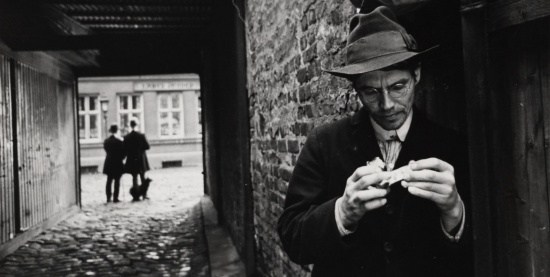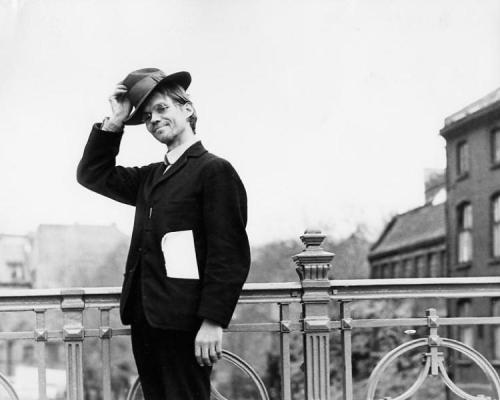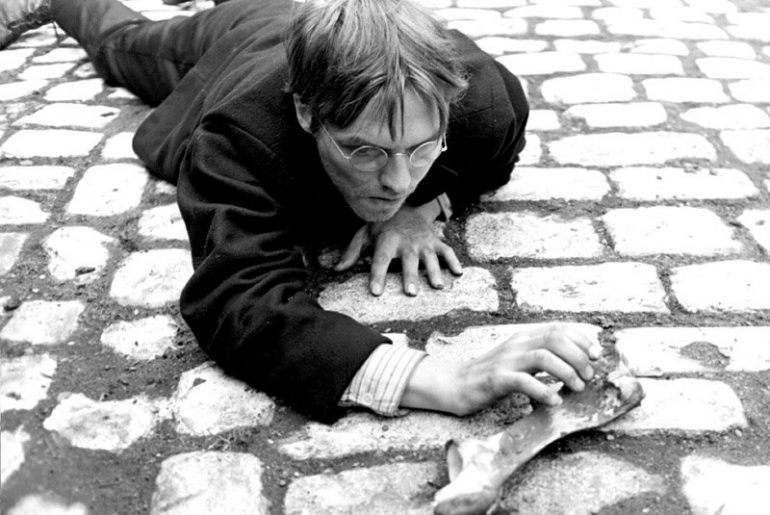Pontus is a starving writer living in Christiana (present-day Oslo, Norway) at the end of the nineteenth century. He is convinced that literary success is just a few hours away. Having submitted his ‘masterpiece’ to a publishing house he just has to wait. While waiting Pontus wanders the streets of Christiana during which time he notices an attractive coquette whom he names Princess Ylajali, primarily for the sound of it. He pursues her and the two begin a disparate flirtation that progress rapidly and ends badly. But Pontus is unable to pay his rent so gets evicted from one rooming house after another until he is forced to sleep beneath a bridge. His loneliness, his homelessness, and his starvation result in a rapid psychological collapse and in the end Pontus yields to despair. He abandons all hope of literary success and heads down to the docks where he cries, “All is lost! All is lost!” then boards a boat without knowing where it’s bound.
Poverty and prolonged starvation have left Pontus physically weak and prone to delusions and despite his desire to be a writer he repeatedly sabotages his own efforts. He pawns his waistcoat for a few pennies but gives the money to a hobbling beggar. When he receives change accidentally from a store clerk he gives it away to a widow selling bread then returns to scold the clerk for forcing him into a position of dishonesty. When Pontus finally receives an advance of ten kroner for a rewrite of his article he stubbornly refuses to take the money. When the money is sent to him by courier he throws it in the face of his mean-spirited landlady who has just evicted him. The story’s pathos lies in Pontus’ stubbornness and pride preventing him from achieving his goal of literary success even though the fragmenting reality of success is his only means of sustenance.

Hunger is a harrowing film and beautifully shot in black and white but it is Per Oscarsson’s twitchy, nervous, and emaciated performance that captures the dissolution of an artist who is decaying both spiritually and physically. Oscarsson’s starved gestures and hungered mannerisms convey the complexity of Pontus’ mental instability, his despair and frustration, as well as his childlike vulnerability. But it’s not all doom and gloom. There are comic moments punctuating the tragedy. For instance when Pontus vehemently argues with a police officer over the exactness of the time. Another when he harangues an old man on the park bench with his fantasized life story of imaginary landlords, hymnbooks that glow in the dark, and Princess Ylajali—who sleeps on a divan of yellow roses and owns a retinue of a thousand slaves. And when Pontus is rejected by the fire brigade for wearing glasses he simply takes them off and lines up again for inspection—delightfully Chaplinesque. Such moments add a touch of warmth and lightness to an otherwise bleak portrait of artistic genius plunging over the edge of insanity.
–Zachariah Rush

ABOUT THE AUTHOR:
Zachariah Rush was born in Manchester, England where his early poetry was published in small press anthologies and journals. Since moving to the USA in 2007 he has published the books ‘Beyond the Screenplay: A Dialectical Approach to Dramaturgy’ (McFarland, 2012) and ‘Cinema & its Discontents’ (McFarland, 2016), as well as dozens of essays of film criticism in journals published by Intellect (UK) and University of Chicago Press (USA). He also translated Albert Camus’s existential classic L’étranger into a libretto for operatic performance. His most recent publication was the autobiographical poem ‘Ode to Bipolar’ published in Poetry Now the journal of the Sacramento Poetry Center.






